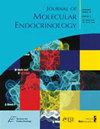NuRD复合体的Chd4亚基调节参与β细胞功能的pdx1控制基因。
IF 3.6
4区 医学
Q2 ENDOCRINOLOGY & METABOLISM
引用次数: 2
摘要
2型糖尿病(T2D)与β细胞亚群中转录因子(TFs)的缺失有关。在这些tf中有Pdx1,它控制许多参与维持β细胞功能和身份的基因的表达。Pdx1活性由转录共调节因子调节,最近通过无偏筛选显示,Pdx1活性与核小体重塑和去乙酰化酶复合物的Chd4 atp酶亚基相互作用。Chd4有助于维持许多不同细胞类型的细胞身份和功能状态。在这里,我们证明了Pdx1在生理和刺激条件下与Chd4在胰岛β细胞内动态相互作用。我们确定了Chd4在体外调节胰岛素分泌和调节许多Pdx1结合基因中的基本作用,包括MafA TF,其中我们发现Chd4结合在MafA区域3增强子上。此外,我们发现体内代谢诱导应激下胰岛β细胞中Pdx1:Chd4的相互作用在T2D患者供体组织中显著受损。我们的研究结果证实了Chd4在体外调节胰岛素分泌和调节Pdx1结合基因中的基本作用,并且Pdx1:Chd4相互作用的破坏与T2D相关的β细胞功能障碍相吻合。本文章由计算机程序翻译,如有差异,请以英文原文为准。
The Chd4 subunit of the NuRD complex regulates Pdx1-controlled genes involved in β-cell function.
Type 2 diabetes (T2D) is associated with loss of transcription factors (TFs) from a subset of failing β-cells. Among these TFs is Pdx1, which controls the expression of numerous genes involved in maintaining β-cell function and identity. Pdx1 activity is modulated by transcriptional coregulators and has recently been shown, through an unbiased screen, to interact with the Chd4 ATPase subunit of the Nucleosome Remodeling and Deacetylase complex. Chd4 contributes to the maintenance of cellular identity and functional status of numerous different cell types. Here, we demonstrate Pdx1 dynamically interacts with Chd4 under physiological and stimulatory conditions within islet β-cells. We establish a fundamental role for Chd4 in regulating insulin secretion and modulating numerous Pdx1 bound genes in vitro, including the MafA TF, where we discovered Chd4 is bound at the MafA Region 3 enhancer. Furthermore, we found that Pdx1:Chd4 interactions are significantly compromised in islet β-cells under metabolically-induced stress in vivo and in human donor tissues with T2D. Our findings establish a fundamental role for Chd4 in regulating insulin secretion and modulating Pdx1-bound genes in vitro, and disruption of Pdx1:Chd4 interactions coincides with β-cell dysfunction associated with T2D.
求助全文
通过发布文献求助,成功后即可免费获取论文全文。
去求助
来源期刊

Journal of molecular endocrinology
医学-内分泌学与代谢
CiteScore
6.90
自引率
0.00%
发文量
96
审稿时长
1 months
期刊介绍:
The Journal of Molecular Endocrinology is an official journal of the Society for Endocrinology and is endorsed by the European Society of Endocrinology and the Endocrine Society of Australia.
Journal of Molecular Endocrinology is a leading global journal that publishes original research articles and reviews. The journal focuses on molecular and cellular mechanisms in endocrinology, including: gene regulation, cell biology, signalling, mutations, transgenics, hormone-dependant cancers, nuclear receptors, and omics. Basic and pathophysiological studies at the molecule and cell level are considered, as well as human sample studies where this is the experimental model of choice. Technique studies including CRISPR or gene editing are also encouraged.
 求助内容:
求助内容: 应助结果提醒方式:
应助结果提醒方式:


